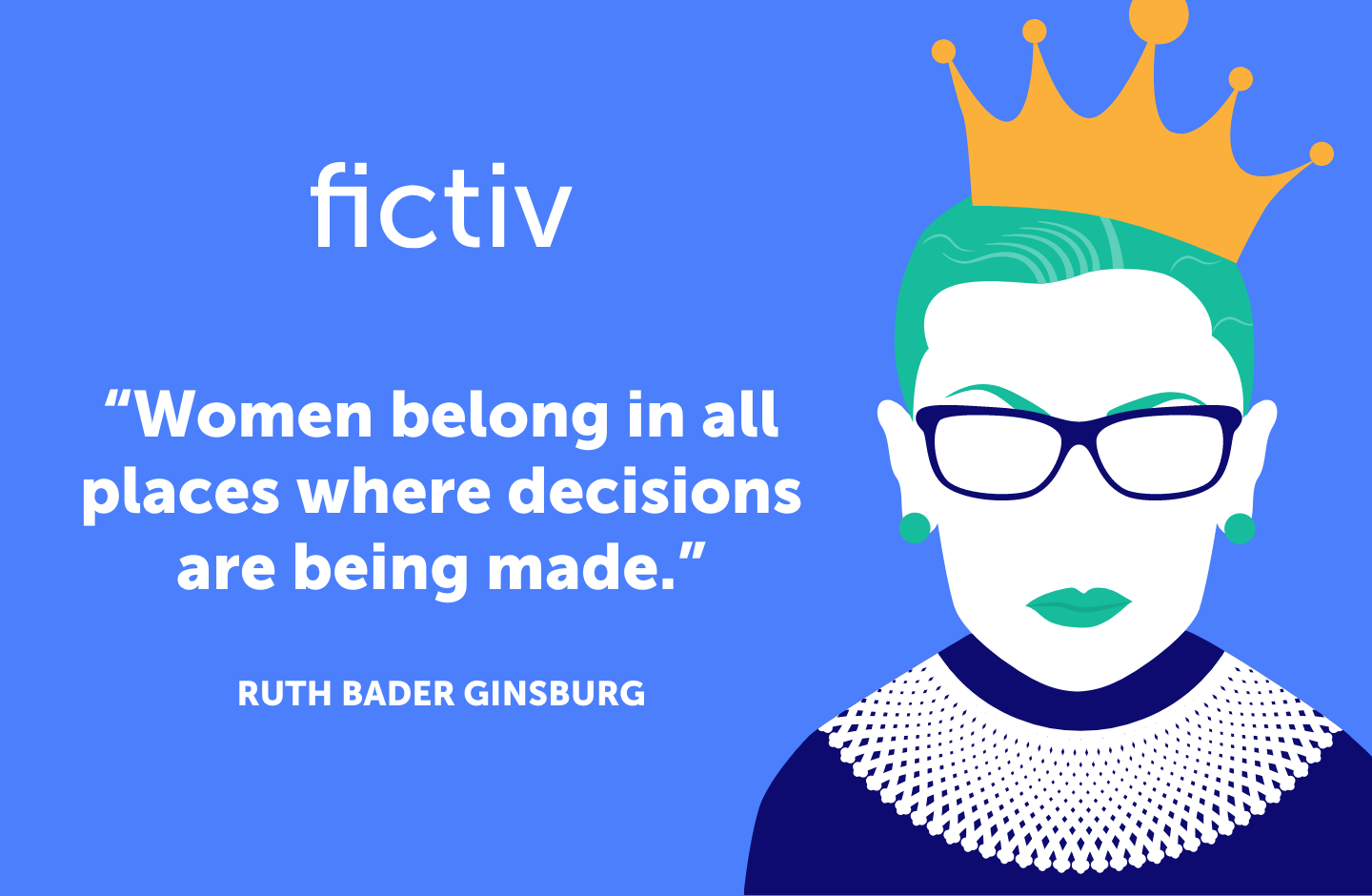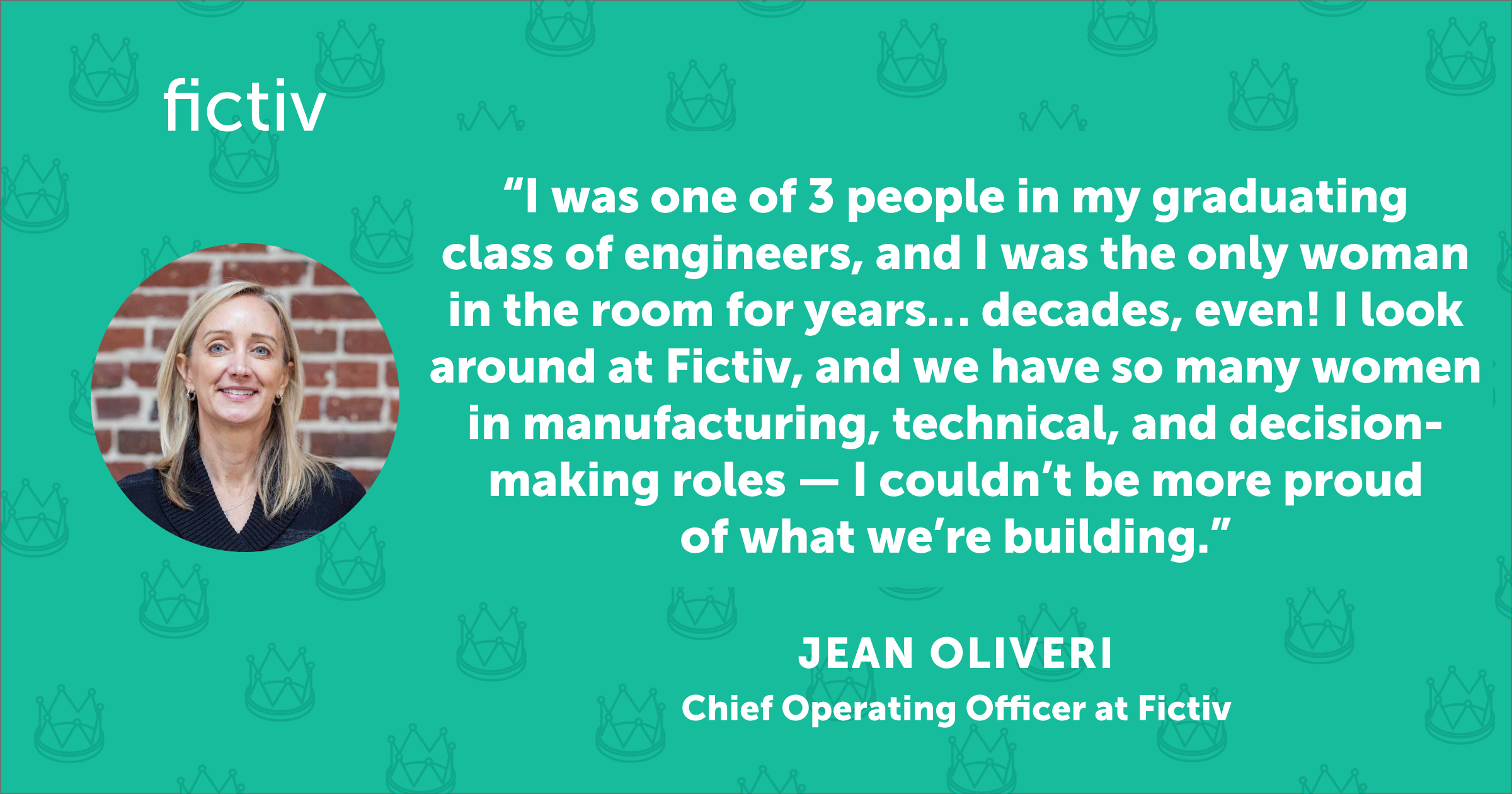Time to read: 10 min

Ruth Bader Ginsburg was a staunch advocate for women’s rights throughout her illustrious career as both lawyer and judge. As one of the pre-eminent legal minds of her generation, she won plenty of battles in the fight for gender equality, but women ascending to the highest levels of power in business (and elsewhere) remains an all-too-rare occurrence. Still, it happens more often now than ever before thanks to Justice Ginsburg’s efforts, and the efforts of many others who share her beliefs.
That progress is clearly evident at Fictiv, where women hold multiple executive positions that are almost always occupied by men — the Chief Operations Officer, Chief Revenue Officer, and VP of Engineering are all women. So, to honor International Women’s Day, COO Jean Oliveri and CRO Joanne Moretti sat down to talk about their career paths and the importance of having women in positions of power.
Why do companies need women in leadership?
Jean: To me, the simple answer is representation. As of 2020, the world population was roughly split 50/50, men to women. Women are every bit as capable as men and should bring their voice in equal representation wherever their interests lie. And I truly believe that women anywhere should have the same degree of opportunity, in every sense, that is afforded to men.
It may be an idealistic approach, but lack of representation is an issue I’ve been working on throughout my career to change and improve, both for myself and for the women around me. We have to strive for that equal representation because that generates increased awareness and acceptance, which in turn creates greater opportunities for future generations.
Joanne: Yes! This brings me to why I love the RBG quote that’s leading this article. Women bring a different perspective to the table, and the more perspectives you have in the room, the better the decisions will be. The bottom line is that having women in leadership positions is good for business.
How good? My go-to on the topic of women and gender diversity in business and leadership is the annual report by Credit Suisse called the “Gender 3000”. As the name implies, it surveys 33,000 individuals across 3,000 companies, in 46 countries. Their 2021 survey highlights why women in leadership are so important. The study found the best-performing companies in terms of share price display superior diversity in both the boardroom and the C-Suite — though performing on the former and failing on the latter erodes the “diversity premium.” And the premium is quantifiable.

Specifically, greater diversity coincides with better EBITDA margins across time. Comparing the average margin since 2010 for companies with over a 20% diversity threshold with those below 15% reveals a premium of 1.6 percentage points. If we lower the threshold to less than 10%, the gap is even wider. In fact, the margin gap across the ascending tiers of diversity is remarkably stable over time.
Also, 28% of the companies with above-average female representation have credit ratings of A– or higher, and companies with more than 20% management diversity have traded at an average premium of 13% to companies with less than 15% female. There are several other major indicators that show up like this, but the overall consensus is that combining women both at the board level and in senior management roles is a winning combination.
Jean: I one hundred percent agree, Joanne. As a leader, I demand diversity in my business, and that means operating with consideration and respect for all voices, which includes women wherever they happen to be sitting — it’s not just about gender, but also compassion, empathy, and cultural sensitivity. They all contribute to my team achieving superior results.
Why aren’t more women in leadership positions? And what needs to happen to get more women into positions of power?
Joanne: I think some women (and men) make a conscious decision about where they will focus. They realize that aiming for a senior executive role means things like longer hours, travel, and giving up weekends for emergency meetings.
I believe that raising a family requires a partnership and both women and men are making decisions on which career in the family will lead. My husband never went back to his role at Microsoft after taking parental leave — instead, he stayed home for 14 years to focus on our family. Because we were both traveling and pursuing demanding careers, once we had the children we realized a choice needed to be made. From that point forward I leaned into my career, worked the crazy hours, took on roles that stretched me, and pursued executive leadership opportunities.
Now, my story may not be typical, but I believe that it’s becoming more and more common because it’s become more acceptable for men to choose to be the primary caregiver. And when making conscious decisions about who will lean into a career and who will lean into family, increasingly women are choosing to focus on their careers. I have 3 friends who occupy leading executive positions, while their husbands cover the homefront.

So, to answer the question, I think it boils down to choices about where women want to be and what role they want to play — assuming that their company gives them that option to choose to pursue an executive role (unfortunately, many still don’t). Right now, it still skews heavily towards women as caregivers and men as breadwinners, but that’s slowly changing by a percentage or two a year, and I think that change will continue as the roles and responsibilities of parents shift and evolve.
Jean: From my perspective, there are a lot of women in leadership roles already, and it’s trending in the right direction. Over my three decades in business, there are many more women leading now than when I started. Are there enough women in leadership positions across industries? Obviously, no. We have a long way to go.
So, women have to continually speak up and demand a seat at the table. It’s about having the confidence that we belong and that our voice matters. We have to actively pass down our knowledge to other women. We’re behind in no small part because generations of older men have passed down their knowledge to younger men. Women who have gained that knowledge need to make a point of sharing what we know with the next generations of women, too. It’s about helping other women get in the game and celebrating their successes when they do.
The good old boy system has served men quite well, and it’s time we start building something that isn’t similarly exclusive but serves women in similar ways.
What obstacles on your career path did you overcome? And what did you learn in overcoming them?
Joanne: My biggest challenge was the feeling of guilt about balancing my career with my family. That feeling was with me until my husband pulled me aside and helped me realize that parenting and caregiving is not exclusive to women — that there was nothing to feel guilty about when one parent, regardless of gender, fills that role.
As far as business obstacles, my biggest obstacle is myself. I get in trouble when I measure others through my lens. Everyone learns differently and sees and feels differently, and it’s important to be empathetic and understand everyone is different. Otherwise, I’m fortunate to have support at home and a partner who not only loves me but admires me, too. So, I find few, if any obstacles, in the way.
Jean: In general, I’ve dealt with the same headwinds that I think all women face. I always felt like that when a man walks in a conference room, they start at the top. There is an assumption that they belong there.
Women, however, don’t get that same benefit of the doubt. We start at the bottom and have to prove ourselves, building our credibility through word and deed. I feel that women have always had to fight for their right to be there, while it’s simply given to men. It’s why I’ve always taken on the fight to be the best I could be whether it was in sports or business, and that attitude is how I’ve been successful.
I also think that through people like Joanne, myself and other strong women gaining power, we’re changing that attitude and culture, little by little. Hopefully, all women will get on equal footing someday. I don’t expect that to happen anytime soon, but we are doing it now at Fictiv!
How have work environments changed for women during your career?
Joanne: Today, I’m in a progressive paradise at Fictiv. Powerful women are everywhere. Jean’s our COO, I’m CRO, a soon-to-be-announced woman heads up engineering, and Anna is responsible for People Ops. (We even have Mark, a man, running Marketing, which is typically a role that skews female). We have an incredible seat at the table, where results count, not skin color, gender, or religious beliefs.
It’s a drastic difference compared to 35 years ago when I started. Back then I received misogynistic comments all day long, unequal access to promotions and pay, and plenty of inappropriate advances — one so serious I literally punched the guy in the face. It was the wild west, and it was painful. Many men are threatened by powerful women. I have been told “not to emasculate men in public,” and have been criticized for being too stubborn, too opinionated, and too vocal on more than one occasion.
I’m not ignorant enough to believe that because I sit in San Francisco, I have the same experience as women working in Oklahoma, or Arkansas, or many other places.
– Jean Olivier, COO, Fictiv
So, about 16 years ago I decided to do something about it and started a chat group for women inside CA Technologies. It was a space where women celebrated accomplishments and discussed their concerns, and together we overcame many obstacles. In the years that followed, that organization turned into the Butterfly Group on LinkedIn. We now have almost 500 women helping and supporting one another through career changes, sponsorships, and investments.
Jean: I agree with Joanne about how wonderful it is to work in the environment we do at Fictiv. However, I’m not ignorant enough to believe that because I sit in San Francisco, I have the same experience as women working in Oklahoma, or Arkansas, or many other places. When I started my career, I was in the midwest, in workplaces that were not great environments for women.
And I think many women are still fighting the same issues that Joanne was talking about, and I’m not just talking about in the US, either. Women around the world are facing these issues. That said, I think some work environments have become more respectful. We have laws and rules in place that have changed what is acceptable in the workplace while prohibiting and limiting some of the grotesque behaviors that I had to put up with in years past.
Now, I’m at a level in my career where I can have strong input into the environment that I create for other people, and at my last four companies, I’ve made damn sure that we had zero tolerance for those behaviors at each one.
What advice would you give to young women who want to become strategic decision-makers at work?
Joanne: Learn finance. If there’s one thing that will help you no matter what role you’re in, it’s speaking the language of business and cultivating financial acumen. Doing so levels the playing field and will change your world as it changed mine. I read books on the topic — the best resource I found was a book called Financial Intelligence — and learned from the best in business by watching and asking a lot of WHYs (the “5 Whys” is my favorite way to drill down to find answers).
Learn finance. If there’s one thing that will help you no matter what role you’re in, it’s speaking the language of business and cultivating financial acumen.
– Joanne Moretti, CRO, Fictiv
Second, be of service to other people. Your team, your peers, your customers, your partners, your friends, and, of course, your family. Rather than seeking command, or to gain something from others, put others first.
Jean: Be aware of the types of people you’re working with, and don’t stay at a company that doesn’t treat you with respect. Also, focus on proving your value and being dependable and trustworthy — do what you say you’ll do, then deliver.
Why is Fictiv a great place for women to build their careers?
Joanne: For many years, at the vast majority of companies there were only ever one or two women in the room — even at my last stop before coming to Fictiv, I was always one of the only women at the executive level.
What’s astounding about Fictiv is that everyone has a seat at the table — we have women excelling in non-typical roles that usually skew 100% male, like me as CRO and Jean as COO. And perhaps most importantly, our voices are not only welcomed but appreciated as well. We influence the decisions being made about company strategy.
Our co-founders Nate and Dave Evans appreciate the value of diverse viewpoints and understand the diversity premium better than anyone I know. In fact, before I started at Fictiv full-time, they asked me to be the independent board member on Fictiv’s board! I think that speaks volumes about how they value diversity of thought. There are no secret boy’s clubs here where decisions are made.
Jean: Like Joanne, I’m excited about what the company is doing. I was one of 3 people in my graduating class of engineers, and I was the only woman in the room for years… decades, even! I look around at Fictiv, and we have so many women in manufacturing, technical, and decision-making roles — I couldn’t be more proud of what we’re building. I think it’s representative of how the world is changing and will hopefully continue to change.










